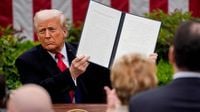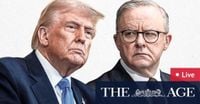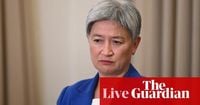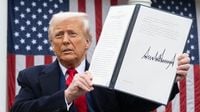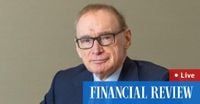In a bold move that has sent ripples through global trade, President Donald Trump announced a sweeping package of reciprocal tariffs on Wednesday, April 2, 2025, affecting over 180 countries. Speaking from the Rose Garden at the White House, Trump characterized the tariffs as "discounted reciprocal" rates, claiming they are designed to address the imbalance caused by foreign tariffs on U.S. goods.
"For nations that treat us badly, we will calculate the combined rate of all their tariffs, non-monetary barriers and other forms of cheating, and because we are being very kind, we're kind people ... we will charge them approximately half of what they are and have been charging us," Trump stated. He emphasized that these tariffs are not full reciprocals, indicating a softer approach than what could have been implemented.
The tariffs will take effect immediately, with a baseline tariff of 10% applied to all countries not on the specific list provided by the administration. The tariffs targeting specific nations include:
- China: 34% (which brings the total to 54% when combined with existing tariffs)
- European Union: 20%
- Vietnam: 46%
- Taiwan: 32%
- Japan: 24%
- India: 26%
- South Korea: 25%
- Thailand: 36%
- Switzerland: 31%
- Indonesia: 32%
- Malaysia: 24%
- Cambodia: 49%
- United Kingdom: 10%
- South Africa: 30%
- Brazil: 10%
- Bangladesh: 37%
- Singapore: 10%
- Israel: 17%
- Philippines: 17%
- Chile: 10%
- Australia: 10%
- Pakistan: 29%
- Turkey: 10%
- Sri Lanka: 44%
- Colombia: 10%
- Peru: 10%
- Nicaragua: 18%
- Norway: 15%
- Costa Rica: 10%
- Jordan: 20%
- Dominican Republic: 10%
- United Arab Emirates: 10%
- New Zealand: 10%
- Others include numerous smaller nations with varying rates.
Trump's announcement has been met with mixed reactions. Australian Prime Minister Anthony Albanese expressed his disappointment, stating that the tariffs are "totally unwarranted" and do not align with the partnership between the U.S. and Australia. He emphasized that the tariffs would ultimately burden American households, saying, "It is the American people who will pay the biggest price for these unjustified tariffs." Albanese ruled out imposing reciprocal tariffs against the U.S., stating, "We will not join a race to the bottom that leads to higher prices and slower growth."
Opposition leader Peter Dutton criticized the government for not securing a direct line of communication with Trump. He labeled Albanese as "weak and missing in action" and urged the government to negotiate hard on behalf of Australia's interests. Dutton highlighted that the U.S. requires Australian beef, stating, "They can't produce enough beef to satisfy domestic consumption." He further expressed concern that jobs would be lost due to the tariffs.
Bran Black, chief executive of the Business Council of Australia, echoed Dutton's sentiments, expressing deep disappointment over the tariffs. He pointed out the historical ties between the U.S. and Australia, stating, "Every Australian should be disappointed by these tariffs." Black emphasized the importance of maintaining free trade and warned against retaliatory measures, which could exacerbate the situation.
As the news broke, financial markets reacted swiftly. U.S. stocks began to plummet in after-hours trading, with Dow futures dropping by 2.32%, S&P 500 futures by 3.40%, and Nasdaq 100 futures by 4.22%. The Australian share market mirrored this trend, with the ASX 200 and All Ordinaries both down by 1.8%. The Australian dollar also fell by 0.8%, trading below 62.4 US cents.
In a press conference, Foreign Minister Penny Wong described the tariffs as a "poor decision" and called for political unity in response to the crisis. She dismissed Dutton's suggestions for negotiation as "captain obvious" remarks, reiterating that the government has been actively engaging in discussions regarding trade. Wong urged Dutton to stop his relentless criticism and focus on collective efforts to address the tariffs.
Meanwhile, the inclusion of the uninhabited Heard Island and McDonald Islands in the tariff list raised eyebrows. These territories, known for their wildlife rather than human populations, have been subjected to a 10% tariff, leading to questions about the rationale behind such decisions.
As the situation unfolds, the Australian government faces pressure from both the public and the opposition to respond effectively to the tariffs while safeguarding the nation's economic interests. With the tariffs set to take effect on April 5, 2025, the implications for various industries and the broader economy remain uncertain.
In summary, President Trump's announcement marks a significant escalation in international trade tensions, with potential repercussions for global markets and diplomatic relations. As countries navigate this new landscape, the focus will be on how they adapt to these tariffs and whether negotiations can lead to a resolution that benefits all parties involved.
